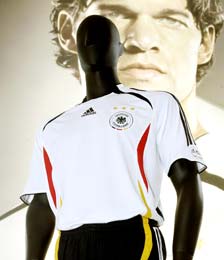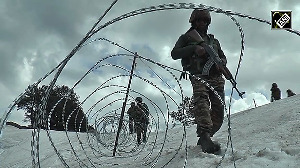Adidas has lost the first match-up in the mounting World Cup marketing battle in the sporting goods industry.
The opening game between Germany and Costa Rica in Munich on June 9 is still weeks away, but the industry is already gearing up for its biggest ever set-to at world soccer's premier event.
 Adidas, which has dominated previous World Cups, will sponsor fewer teams participating at this year's tournament than long-time arch rivals Nike and Puma.
Adidas, which has dominated previous World Cups, will sponsor fewer teams participating at this year's tournament than long-time arch rivals Nike and Puma.
Just six teams will be playing in Adidas's trademark three-stripes kits, while U.S. Nike has signed up eight teams to wear its "swoosh" logo, among them five-times champions Brazil.
"It's remarkable that market leader Adidas will have fewer teams than its toughest pursuer Nike," said analysts at German Landesbank Rheinland-Pfalz in a study.
Smaller German rival Puma will supply 12 teams with jerseys featuring its leaping red-cat trademark.
Adidas, which supplies hosts Germany and the 1998 world champions France, had bad luck as some of its partners such as European champions Greece, Nigeria and China failed to qualify.
But Adidas has vowed to fight back and play out its role as an official sponsor of world soccer body FIFA, which will give it advertising rights in the 12 stadiums.
With a total global audience of 32 billion expected to watch the 64 matches on television -- 10 percent more than in 2002, according to TV rights agency Infront -- the competition to raise brand awareness has never been tougher.
Marketing costs are treated as secrets but Adidas and Puma have said they will stage their biggest ever marketing campaigns, while Nike plans to spend more than at the 2002 Cup.
RISING COMPETITION
Nike and Puma have invested heavily to challenge Adidas, the global soccer shoes market leader for decades.
Nike, the world's number one sports equipment maker, chose a symbolic venue to kick off its attack on Adidas and unveil its World Cup kits -- Berlin's Olympic stadium where the World Cup final will be played on July 9.
"We are realising on the pitch and on the street our goal to become the leading football brand," Charles Denson, president of the firm's key Nike brand told Reuters.
Nike hopes to repeat its success from the 2002 World Cup in Japan and South Korea, where its partners Brazil beat Adidas's flagship Germany in the final, boosting sales of Brazilian team look-alike
LRP analysts say Nike is still lagging Adidas in the market for soccer gear but has come closer with a market share of 30 percent. Adidas has some 35 percent and Puma around 9 percent.
Puma plans to open shops in towns where its teams are playing and has also enlisted Brazilian soccer great Pele, who once wore Puma shoes on the pitch.
"We want to turn the duel of the big two into a three-way fight," said Puma Chief Executive Jochen Zeitz recently.
But Adidas still sees itself in a prime position at the World Cup because it has been a FIFA partner since 1970.
Adidas will supply the official match balls, provide gear for the referees, linesmen and ball boys. It has also certain merchandise rights to sell gear with the Cup logo.
LONG BATTLE
For decades, Adidas used to dominate the soccer gear market ever since it provided the German team with boots with studs for the 1954 World Cup. The studs helped West Germany beat Hungary in the final on a rain-soaked pitch in Bern.
While the studs became standard, Adidas's founder Adi Dassler kept his company ahead of the pack by striking deals to supply most national teams, for free or modest payment, regardless of political boundaries.
Team sponsorships evolved into a multi-million business with firms starting to pay huge sums in the 1970s when Nike and others entered the fray.
No firm reveals how much they pay top players on the pitch but analysts and media estimate that Nike's contract with Brazil as well as deals with large soccer associations such as Germany are worth a double-digit millions amount annually.
Adidas also has some 300 players under contract, allowing them to wear the three-stripe boots even if their national associations are partners of competitors. England's David Beckham will wear Adidas shoes and a jersey by Umbro.
But sometimes such deals create problems.
Dutchman Johann Cruyff, a Puma partner, refused to play in an Adidas kit in the 1974 final against West Germany -- he did so only after getting a two-striped version instead.
Photograph: AFP/Getty Images








 © 2025
© 2025